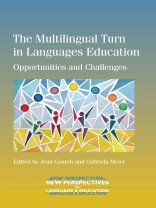Starting from the key idea that learners and teachers bring diverse linguistic knowledge and resources to education, this book establishes and explores the concept of the ‘multilingual turn’ in languages education and the potential benefits for individuals and societies. It takes account of recent research, policy and practice in the fields of bilingual and multilingual education as well as foreign and second language education. The chapters integrate theory and practice, bringing together researchers and practitioners from five continents to illustrate the effects of the multilingual turn in society and evaluate the opportunities and challenges of implementing multilingual curricula and activities in a variety of classrooms. Based on the examples featured, the editors invite students, teachers, teacher educators and researchers to reflect on their own work and to evaluate the relevance and applicability of the multilingual turn in their own contexts.
Innehållsförteckning
Contributors
Foreword
Acknowledgments
Jean Conteh and Gabriela Meier: Introduction
PART I
Gabriela Meier: Introduction to Part I
1. Mooznah Auleear Owodally: Socialized into Multilingualism: A Case Study of Mauritian Preschools
2. Ken Cruickshank: Exploring the -Lingual between Bi- and Mono-: Young People and their Language in an Australian Context
3. Guangwei Hu and Sandra Mc Kay: Multilingualism as Portrayed in a Chinese English Textbook
4. Andrea Young: Looking through the Language Lens: Monolingual Taint or Plurilingual Tint?
PART II
Jean Conteh: Introduction to Part II
5. Laurent Gajo: From Description to Didactization of Multilingualism: European and Francophone Research at the Crossroads between Linguistics and Didactics
6. Gabriela Meier: Our Mother Tongue is Plurilingualism: An Orientation Framework for Integrated Multilingual Curricula
7. Jean Conteh, Fiona Copland and Angela Creese: Multilingual Teachers’ Resources in three different Contexts: Empowering Learning
8. Gabriela Meier: Multilingualism and Social Cohesion: Two-Way Immersion Education meets Diverse Needs
PART III
Jean Conteh and Gabriela Meier: Introduction to Part III
9. Jean Conteh, Shila Begum and Saiqa Riasat: Multilingual Learning in Primary Settings – From the Margins to the Mainstream
10. Enrica Piccardo and Joëlle Aden: Plurilingualism and Empathy: Beyond Instrumental Language Learning
11. Ofelia García and Naomi Kano: Translanguaging as Process and Pedagogy: Developing the English Writing of Japanese Students in the US
12. Jim Anderson and Yu-Chiao Chung: Transforming Learning, Building Identities: Arts Based Creativity in the Community Languages Classroom
Gabriela Meier and Jean Conteh: Conclusion
Om författaren
Gabriela Meier is a Senior Lecturer in Language Education at the Graduate School of Education, University of Exeter, UK. Having lived, worked and studied in different linguistic regions in Europe, she speaks four languages, and has always had a keen interest in languages, social cohesion and social justice. She gained her Ph D in 2009, based on a study of Europa-Schule Berlin. Since then, her research led to a range of publications in the field of bilingual and multilingual education, above all from a social cohesion and critical perspective. She works as a teacher educator at Masters level and supervises many doctoral projects in this field.












